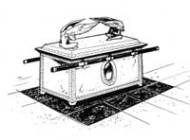A relationship is a covenant – at least it is if you want it to last.

“No way,” someone said. “That’s getting too serious.” I suggest that if you take that attitude, then maybe your track record with relationships is a bit spotty.
A covenant in the simplest form is an agreement. Isn't that what people do? They agree to become friends; to work together; to have a relationship. Sometimes they never actually say the words, but by mutual consent, they enter into a relationship – a covenant or agreement with each other..
When they do that, they usually have some expectations of each other. As long as those expectations are reasonably met, the relationship continues.
That’s in its simplest form.
There are also formal covenants.
Marriage would be the most common example of a formal covenant. When two people stand before a judge, priest, or minister and before witnesses making vows to seal their relationship, they enter into a formal covenant together. By taking the vows, they incur legal liabilities and life-long responsibilities to both each other and their progeny.
To what extent is each responsible to the success of the covenant? It’s popular today to talk about a 50-50 relationship meaning that each person has an equal responsibility to the success of the relationship. The parties have divided the responsibilities of the relationship much like they might divide the household chores. This can lead to keeping a figurative balance sheet so each can ensure that the other is doing their part.
I submit that 50-50 that weakens many relationships.
Consider this proposition: A strong relationship is 100% - 100% with each person agreeing to be responsible for making all the effort to fulfill the relationship. If both parties are doing all they can to keep the relationship strong, how can it fail? This approach provides for the relationship to remain strong when one party or the other for some reason cannot keep up their part. Then the pendulum of life may swing and the other party assumes more of the responsibility for a time.
And you never get to the point of one party saying, “That’s more than I agreed to do,” because each agreed to do 100% if necessary.
What about the kids?
Your children lock you into an incredibly strong, one-sided covenant. When you create a child, you are agreeing to do everything possible (100%) to help that child become an independent, responsible adult. When parents do that, the likelihood of the child growing to truly functioning maturity is greatly enhanced.
You hurt the innocent if you shirk your covenant to your kids.
Does this chap you?
Did it rub you the wrong way to read what I've written? Why does that bother you?
If you’re carrying emotional baggage that prevents your fully participating in a covenant relationship, you can dump that baggage just like yesterday’s garbage.
If your past prevents you from providing for your future, you can shed the past like water off a duck’s back.
If your tomorrow lies in the shadow of your past, you can be rid of those shadows today.
Finding Personal Peace has the tools for living in strong covenantal relationships.
Check it out.
www.findingpersonalpeace.com
Thanks for reading our blog today. I invite you to respond in several ways: (1) Comment in the space below if you agree or disagree with what I’ve said. A dialogue could be interesting for all; (2) Share the post with your friends. There are buttons below for Facebook, Twitter, and other social media sites; and (3) sign up for an email with each new post. There’s a place to do that on the right. Then you won’t have to remember to look for our subsequent posts. Thanks again!















